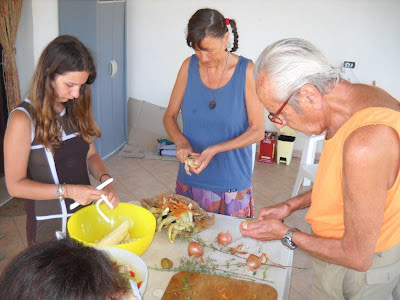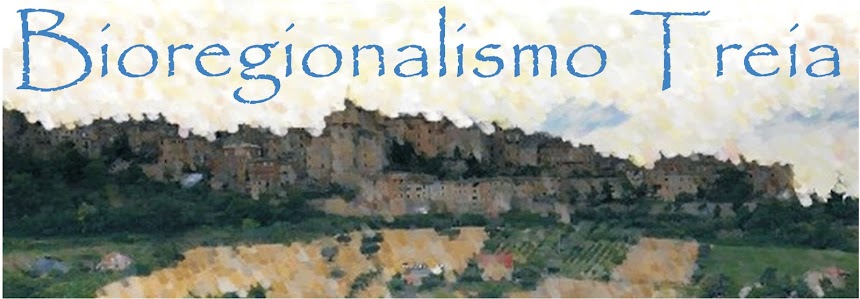
It should be wondered, when one takes a position or makes a choice, whether that choice leads to the common good, our, that of our family, that of our extended family, which is humanity, and of Mother Nature as a whole of the living. In all social, cultural, and spiritual aspects.
What should be the ultimate end, the widest possible, of a bioregionalist (but without the exasperation of one-ism)? It can be the safeguarding of the planet, the re-balancing of life in this world that has been so wretched, exploited, dirtied by man.
And then I take as an example of this speech the food choices: agriculture and organic farming and the reduction of the assumption of animal products ... To this end it is useful to consider the positive effect that would have for the environment a reduction in the consumption of the products of animal arigin, both for our health and for ecological reasons (less waste of resources such as water, soil, greenhouse effect, less pollution at all stages of the production chain).
Obviously each one of us has its own tendencies about food and there are those who add to the above mentioned ecological reasons an ethical motive, as absolute respect for animal life in all its forms. Who think so can bring his vision quietly, but how can these different visions coexist in the same group ?
Many of us live in a state of economic well-being, and we have more than we need, and after we have exploited the planet in awe, to mend from our faults, we would like to protect nature and other animal species in an absolute way . But the forms of life are so many and the bioregional sites are different! We think of peoples living in areas where vegetation is absent for whole or a good part of the year, and the inevitable source of food is just that animal.
Maybe returning to live all in the equatorial forest, where with the fruits that nature offers we could safely survive. Or we can "ADAPT" to the place we live in.
Evolution is adaptation. But he adaptation of the human species in its history has gone to the detriment of the environment that has depleted resources for our greed: possessing far beyond the necessary consumerism, a perverse system based on pollution and destruction !
But how to restart?
One must take advantage of this crucial moment to carry out radical choices that involve very important social aspects, bringing human activities within an acceptable limit, such as reducing working hours, erasing unnecessary work, or renouncing the privileges enjoyed by people in power that make them profitable, but harmful to the community as a whole.
And if, as a human species, or as a part of the human species, we are aware of the unhealthy "progress" we have come to attain, the next evolutionary step for maintaining life on the planet, is not so difficult to understand. It will perhaps be a "step back" towards a more sober life.
I conclude with a phrase by Indian wise Ramana Maharshi, which sums up a bit what I should think of the spirit on which our lives are based: "A society is the organism; its constituent members are the arts that carry out its functions. A member thrives when he is loyal in serving the society as a well-coordinated organ works in the body. While faithfully serving the community, in thoughts, words, and works, a member of it should promote the cause to other members of the community, making them aware and inducing them to be faithful to society as a form of progress for the latter. "
Caterina Regazzi
Referent for Animal Man's Report of the Bioregional Italian Network
....................................
Traduzione in italiano
Il significato di “bene comune” nell'ottica bioregionale e dell'ecologia profonda
Basterebbe chiedersi, quando si prende una posizione o si fa una scelta, se quella scelta porta o meno al bene comune, il nostro, quello della nostra famiglia quello della nostra famiglia allargata, che è l’umanità, e di Madre Natura nel suo insieme dei viventi. Comprendendovi gli aspetti sociale, culturale e spirituale.
Quale dovrebbe essere il fine ultimo, il più ampio possibile, di un bioregionalista (ma senza l’esasperazione di un -ismo)? Può essere la salvaguardia del pianeta, il riequilibrio della vita in questo mondo che è stato tanto snaturato, sfruttato, sporcato dall’uomo.
E allora prendo come esempio di questo discorso le scelte alimentari: agricoltura e allevamento biologici e riduzione del consumo dei prodotti di origine animale… A questo fine è utile considerare l'effetto positivo che avrebbe per l’ambiente una riduzione del consumo dei prodotti di origine animale, sia per motivi di salute, che per motivi ecologici (minore consumo o spreco di risorse come acqua, terra, effetto serra, minore inquinamento in tutte le fasi della catena produttiva).
Ovviamente ognuno poi ha le sue tendenze e c’è chi ci aggiunge un motivo etico, di rispetto assoluto della vita animale in tutte le sue forme, e può portare la sua visione tranquillamente, ma come possono coesistere, nello stesso gruppo, queste diverse visioni?
Molti di noi vivono in uno stato di benessere economico, ed abbiamo di più di quello che ci necessita e dopo averlo sfruttato all’inverosimile il pianeta, per emendarci dalle colpe della nostra specie, vorremmo tutelare la natura e le altre specie animali in modo assoluto. Ma le forme della vita sono tante e gli ambiti bioregionali differiscono fra loro! Pensiamo ai popoli che vivono in zone dove la vegetazione è assente per tutta o buona parte dell’anno e la fonte di cibo irrinunciabile è solo quella animale.
Forse tornando a vivere tutti nella foresta equatoriale, dove con i frutti che la natura offre potremmo tranquillamente sopravvivere, oppure possiamo “ADATTARCI”. L’evoluzione è adattamento. L’adattamento della specie umana, nel corso della sua storia è andato a scapito dell’ambiente che si è impoverito di risorse per la nostra avidità: possesso di tanto oltre il necessario, consumismo, un sistema produttivo perverso basato sull'inquinamento e sulla distruzione!
Ma come ripartire?
Bisogna approfittare di questo momento cruciale per portare avanti scelte radicali, che coinvolgono aspetti sociali importantissimi, riportando le attività umane entro un limite accettabile, come la riduzione degli orari di lavoro, la cancellazione di lavori inutili, od il mantenimento di privilegi goduti da persone in posti di potere che ne traggono lauti guadagni, innecessari e dannosi alla comunità nel suo complesso.
E se, come specie umana, o come una parte della specie umana siamo consapevoli di un "progresso" malsano a cui siamo giunti, il successivo passo evolutivo, per il mantenimento della vita sul pianeta, non è così difficile da capire. Sarà forse un "passo indietro" verso una vita più sobria.
Concludo con una frase del saggio indiano Ramana Maharshi, che riassume un po’ quello che dovrebbe essere secondo me lo spirito su cui improntare le nostre vite: “Una società è l’organismo; i suoi membri costituenti sono gli arti che svolgono le sue funzioni. Un membro prospera quando è leale nel servizio alla società come un organo ben coordinato funziona nell’organismo. Mentre sta fedelmente servendo la comunità, in pensieri, parole ed opere, un membro di essa dovrebbe promuoverne la causa presso gli altri membri della comunità, rendendoli coscienti ed inducendoli ad essere fedeli alla società, come forma di progresso per quest’ultima.”
Caterina Regazzi
Referente per Rapporto Uomo Animali della Rete Bioregionale Italiana

Nessun commento:
Posta un commento